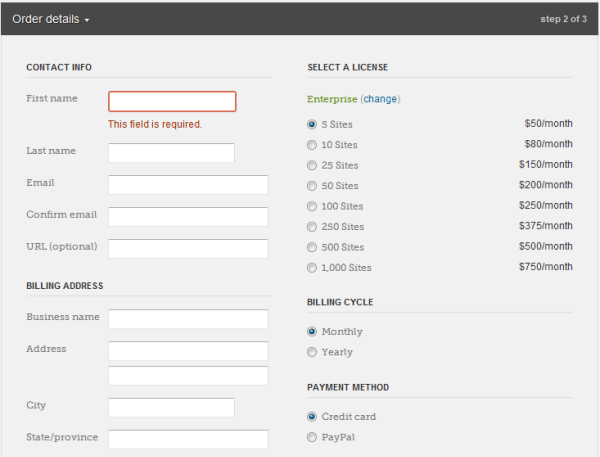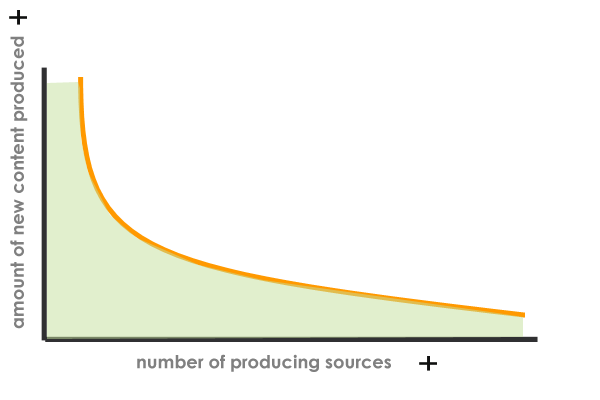The Problem of Free and the Long Tail of Content Production
Internet users have grown accustomed to free content. But this is not without its problems. Jeff Chandler used to produce a Weekly WordPress podcast. His last podcast, "I tried," is dated back in December. It's a long, tired explanation about the difficulties of pouring so much energy into an endeavor that has no substantial financial return. As he moves toward marriage and maintains a full-time job, the amount of free time he can devote to essentially a profitless hobby shrinks even more. After more than 100 podcast episodes, it seems he's starting to change his course.
It's no surprise to me that the podcast would come to an end (at least the recent hiatus seems to portend an end). About a year ago, I remember speaking with a friend of mine who works at WordPress. I told him they should hire Jeff on their WordPress team, because his steam would eventually run out without a sustainable income, and this podcast channel, which had a lot of momentum, would slow. My friend explained that it's not always necessary to incorporate everyone into full-time WordPress employment to ensure their services continue. Looking back, to some degree I was right.
Recently it seems that Automattic, the leaders of WordPress, too, is also feeling the squeeze of free. According to Chandler's last podcast, with the closure of Windows Live services, hundreds of thousands of bloggers have been signing up at WordPress.com. WordPress.com increased from 400,000 users to 900,000 users per month.
I don't know if it's related, but recently I noticed that Automattic started clarifying their prices for Akismet, the plugin that helps block spam. It used to be that when you signed up for a WordPress.com username, you automatically saw an Akismet API key in your profile that you could plug into your blog. I missed this idea, but apparently Akismet was a service that I should have been paying monthly fees for since the beginning. In fact, since I have more than 25,000 page views a month (my site received 57,000 page views last month), I am supposed to pay $50 a month for the Akismet service.
The following image shows the pricing model. If your site receives more than 25,000 page views per month, you have to select an enterprise commercial license starting at $50 a month.

That seemed steep to me, so I deactivated Akismet and am now trying out Antispambee, which so far works quite well. I also closed all comments on posts older than 60 days. Ninety-nine percent of comments on old posts are spam anyway, so this just reduces the amount of possible spam.
While of course I dislike the sudden clarification of Akismet pricing, I have to wonder if WordPress itself isn't feeling the squeeze of free services, somewhat like Jeff with his podcast. Automattic gives a lot of software away for free, making money mostly through add-on services such as custom domain names, access to the stylesheet, and storage space. Controlling spam is a must-do task on a blog, so this is a potential money maker if they can sell it as an add on. (Without a spam blocker, I would receive about 100 spam comments a day, which would essentially kill the open commenting policy on my site.)
I had a more regular podcast on my site last year as well. I will still occasionally post a podcast, but it became clear to me more than a year ago that podcasting wasn't my future. Listeners are far fewer than blog readers, the time required to produce a podcast is much higher, and podcasters are constantly being threatened by big media's move into the amateur's space. Why listen to me drone on about technical writing when you have This American Life, Radiolab, The New Yorker Fiction podcast, and dozens more professional podcasts in your queue?
This brings me to a larger point. More and more free content producers are going to fade away. They're going to realize that, for the effort they put into their sites, the return isn't worth it. Regular, sustainable content produced on a daily basis will decline.
However, because more people will start blogs and podcasts, this decline in content from the free content producers will be balanced out by the general increase in collective content. Your RSS Reader will still be full of new feeds to check out, but rather than reading through your top 20 feeds in your blogroll, you'll read through the top posts from over 200 blog feeds. This is the long tail of content production. Fewer bloggers and podcasters producers will push out regular content because they don't see enough return. But since there will be more content producers overall, readers won't notice a difference.

In other words, never mind that Tom only publishes 1 podcast every 3 months. You can grab podcasts from 15 other sites that are even better. Those 15 other sites may only produce 1 podcast every 3 months as well. But collectively, your iPod is still full of new podcasts to listen to. You just have more variety and more sources that you're pulling from. Content is still free, but the sources are more varied.
Will the paid content model ever work online for amateurs? Will the influencers eventually fade away into a sea of irregular content producers spread out globally? I think so. But I am not saddened by the fact that it's harder and harder to make money online. I like the idea that a global conversation across countries and companies and contexts is taking place. When ideas come from a greater diversity of engaged people, the information is richer and deeper.
For me, the revenue I make from my blog through ads, WordPress consulting, and speaking engagements is minimal compared to the salary from my regular job. I never entertained the idea that my blog could somehow support me and my family. Also, if I somehow did find enough revenue (possible if you're single, live in a shared room outside of town, have no debt or car, and eat only Top Ramen noodles), I would run out of fodder for my blog without a job to keep me challenged. I would slip away from my immersion in the technical writer's world. This world keeps me engaged and provides me with topics to blog about.
If all revenues cease from my blog, I would still find a lot of value in it, because it keeps me professionally engaged. This is why if you're starting a blog, it's probably best to let it accompany your career choice. With this strategy, your blog efforts always provide an indirect financial return on career growth. This indirect financial return can be an incentive that helps you keep blogging even when there seems to be little tangible reward.


